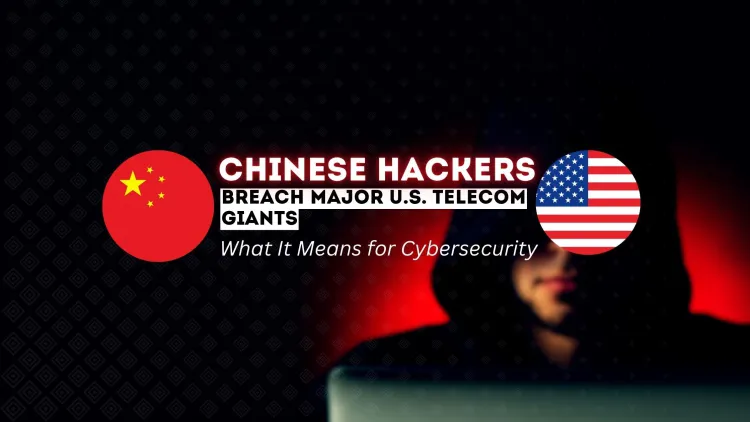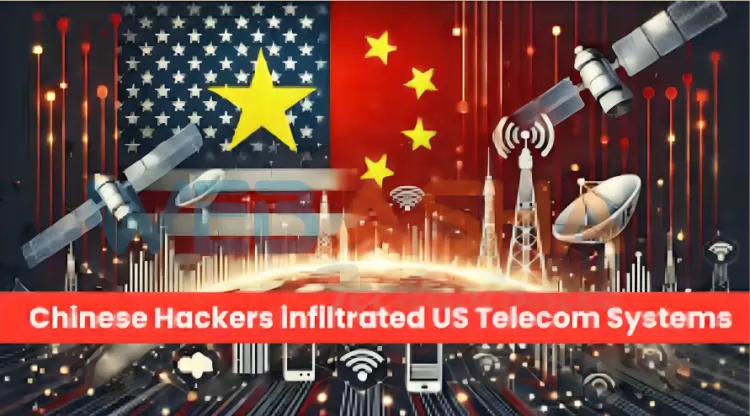Chinese Hackers Breach Major U.S. Telecom Giants | What It Means for Cybersecurity
Chinese hackers, identified as Salt Typhoon, breached the networks of U.S. telecom giants AT&T and Verizon, targeting internal systems for espionage while leaving customer data and services largely unaffected. This attack highlights the growing threat of state-sponsored cyberespionage, exposing vulnerabilities in critical infrastructure and raising national security concerns. Both companies swiftly contained the breach and reinforced their cybersecurity measures. The incident underscores the need for robust defenses, including real-time monitoring, regular audits, and employee training, while reminding customers to prioritize encrypted communication and personal data security. It serves as a stark warning of the interconnected risks in modern telecommunications.

In an alarming revelation, Chinese hackers, identified as the group Salt Typhoon, have successfully breached the networks of two of the largest U.S. telecom companies, AT&T and Verizon. This incident highlights the growing sophistication of cyberattacks targeting critical infrastructure, raising serious concerns about national security and customer data safety. Let’s delve into the details of this breach, what it means for the telecommunications industry, and how we can learn from it.

Understanding the Breach
Imagine someone breaking into your home not to steal your belongings but to observe your daily activities without being noticed. This is essentially what happened in the networks of AT&T and Verizon. Salt Typhoon, a group linked to the Chinese government, infiltrated these networks with the goal of espionage—gathering sensitive information about individuals and organizations of interest.
How the Hack Unfolded
- The hackers gained unauthorized access to internal systems of AT&T and Verizon.
- They specifically targeted a small group of individuals, possibly those in positions of influence or with access to sensitive information.
- The breach allowed them to monitor network data and, in some cases, intercept phone calls.
While no widespread disruption or data theft affecting regular customers was reported, the ability to breach such robust systems is a wake-up call for the industry.
Why is This Attack Significant?
To understand the gravity of this incident, consider this: telecommunications networks are the backbone of global communication, supporting everything from personal phone calls to government operations. A breach in such a critical system is akin to an invisible spy sitting in on high-level meetings.
Key Risks Involved
- Espionage: Unauthorized access to sensitive communications can reveal critical state and business secrets.
- Data Integrity: Manipulation of network data could result in misinformation or system disruption.
- Public Trust: Customers may lose confidence in service providers, fearing data compromise.
What AT&T and Verizon Did to Respond
Upon detecting the breach, both companies acted swiftly:
- AT&T assured that the attack was contained and that no malicious activity persisted in their network.
- Verizon engaged an independent cybersecurity firm to investigate and confirmed that their systems were now secure.
Both telecom giants emphasized their commitment to monitoring their networks and enhancing security protocols to prevent future incidents.
Lessons from the Breach
To make this relatable, imagine you’re running a high-tech security system at home. One day, you find out someone bypassed all your defenses—not to steal but to observe your habits. The natural response would be to upgrade your system and change your routines. This is what the telecom industry must do now.
Best Practices Moving Forward
- Enhanced Monitoring: Real-time monitoring systems can detect unusual patterns early.
- Regular Security Audits: Just like regular health check-ups, networks need periodic assessments.
- Collaboration: Sharing information between companies and government agencies can help identify and neutralize threats faster.
- Employee Training: Many breaches begin with human error. Educating staff about phishing attacks and other tactics is crucial.
The Bigger Picture: Cybersecurity in Telecommunications
This breach is not an isolated incident. In recent years, hackers have targeted major infrastructure, including:
- Toyota’s Supplier: In 2022, a cyberattack disrupted operations at a Toyota supplier, halting production for an entire day.
- Seattle-Tacoma Airport: Earlier this year, the airport faced operational delays due to a cyberattack that caused internet and web system outages.
Such incidents underline the increasing sophistication of state-sponsored hacking groups like Salt Typhoon.
Simple Analogy: The Domino Effect
Think of the telecommunications network as the first domino in a long chain. If the first domino falls (is breached), it can cause a ripple effect, compromising other critical systems like transportation, energy, and finance. This interconnectedness makes telecom security a national priority.
How Customers Can Stay Vigilant
While telecom companies bear the primary responsibility for safeguarding networks, customers can also play a role:
- Use Encrypted Communication Apps: Apps like Signal offer end-to-end encryption, adding an extra layer of security.
- Be Cautious with Personal Information: Avoid sharing sensitive data over unsecured channels.
- Stay Updated: Regularly check for security updates from your telecom provider.
Conclusion
The breach of AT&T and Verizon by Salt Typhoon is a stark reminder of the ever-evolving cybersecurity challenges in the telecommunications industry. While the companies have contained the immediate threat, the incident underscores the need for continuous vigilance, collaboration, and innovation in cybersecurity practices.
For ethical hackers and security professionals, this breach serves as a case study in the importance of securing critical infrastructure. By learning from such incidents, we can work toward a safer, more secure digital future.
FAQs
-
Who is Salt Typhoon?
A Chinese-linked cyberespionage group known for targeting telecommunications networks. -
How did the hackers breach the telecom networks?
The exact methods are undisclosed, but likely involved sophisticated exploits and social engineering. -
Were customer data and calls compromised?
No widespread impact on customers was reported; the attack focused on specific individuals of interest. -
What actions have AT&T and Verizon taken?
They’ve contained the breach, enhanced monitoring, and reassured customers about network safety. -
Why are telecom networks targeted?
They are critical for communication, making them valuable for espionage and intelligence gathering. -
How can telecom companies prevent future breaches?
By implementing real-time monitoring, conducting regular audits, and enhancing employee training. -
What is the role of the U.S. government in such cases?
Agencies like CISA and FBI assist in investigation and enforcing cybersecurity standards. -
What lessons can ethical hackers learn from this breach?
The importance of proactive vulnerability assessment and securing critical infrastructure. -
Are other industries at similar risk?
Yes, interconnected industries like energy, transportation, and finance are also vulnerable. -
How can individuals protect their data?
Use encrypted apps, avoid sharing sensitive information, and stay updated on security best practices.











![Top 10 Ethical Hackers in the World [2025]](https://www.webasha.com/blog/uploads/images/202408/image_100x75_66c2f983c207b.webp)



![[2025] Top 100+ VAPT Interview Questions and Answers](https://www.webasha.com/blog/uploads/images/image_100x75_6512b1e4b64f7.jpg)







